By Cristina Cabrera Jarro -
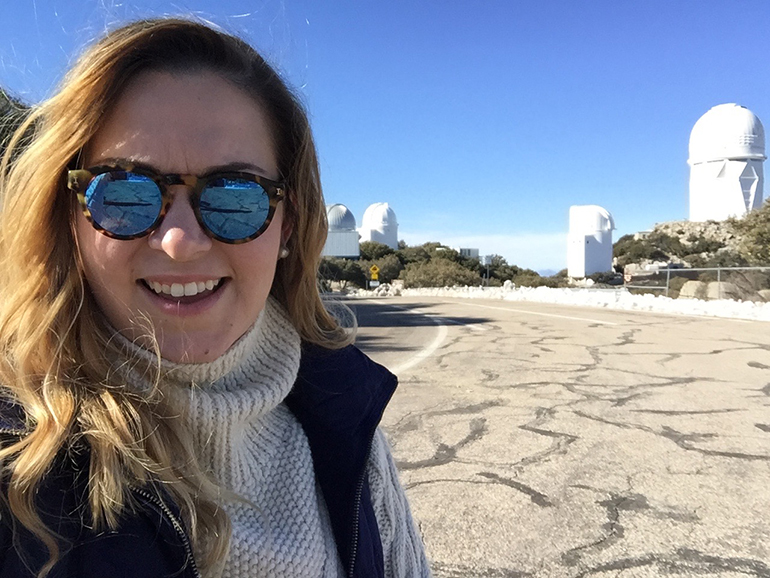
Photographer: COURTESY PHOTO
With telescopes in the background, Immaculate Conception School science teacher Bianca Acosta takes a selfie in front of the Kitt Peak National Observatory.
HIALEAH | The Bible is full of references to the desert. Moses and the Jews, the Magi, the Holy Family, John the Baptist and Jesus all wandered there, at different times and for different reasons.
The desert still serves as a haven for those who seek answers to questions that cannot be answered in the bustle and brightness of a city.
It is also one of the greatest places in the world to see the stars.
For both of those reasons, Bianca Acosta spent a week in the desert in January. Specifically, she went to the Redemptorist Renewal Center in Tucson, Arizona to attend the Vatican Observatory’s Faith and Astronomy Workshop.
Acosta, a middle school science teacher at Immaculate Conception School in Hialeah, was one of only 25 workshop participants. A generous donation from a parishioner enabled her to make the trip. She says she was thrilled at the opportunity, but intimidated.
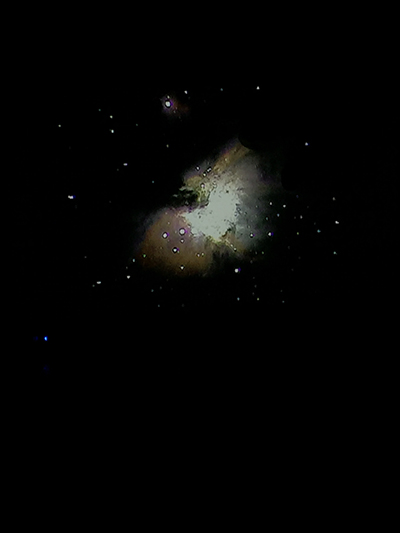
Photographer: COURTESY PHOTO
Specks of stars and light in a nebula far, far away: Immaculate Conception School teacher Bianca Acosta captured this telescopic view of Orion's Nebula.
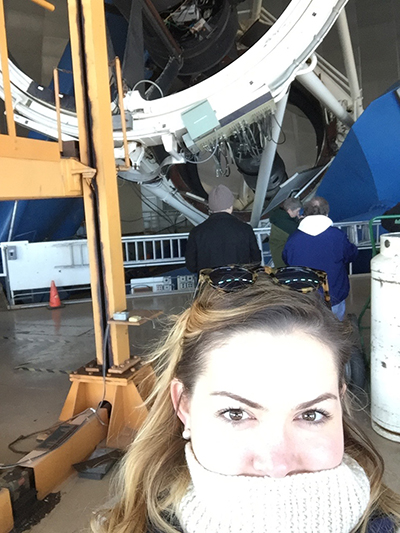
Photographer: COURTESY PHOTO
Immaculate Conception School science teacher Bianca Acosta gets up close with the Mayall Telescope located in the Kitt Peak National Observatory in Tuscon, Arizona.
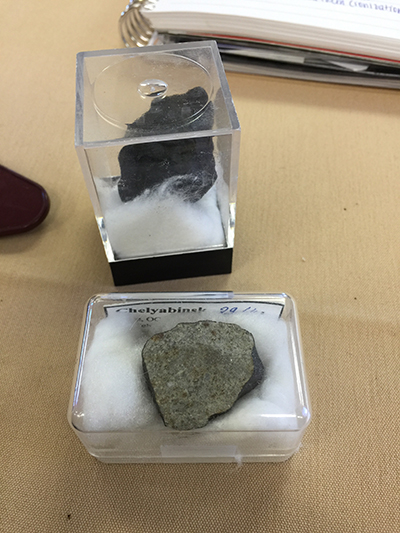
Photographer: COURTESY PHOTO
A piece of the meteorite from Chelyabinsk, that crashed in Russia in 2013, was among the items of galactic history examined by participants of the Vatican Observatory Faith and Astronomy Workshop.
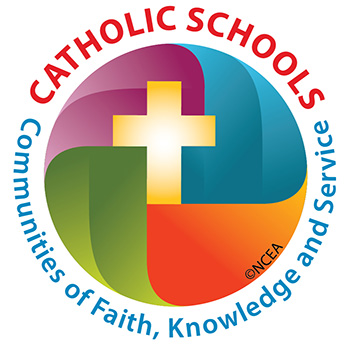
Catholic Schools Week is being celebrated Jan. 31-Feb. 6, 2016.
“My first thought was, ‘God, guide me to where you want to go,’” Acosta said. “I have no idea where I’m going. This is the first time that I’m going to Tucson, Arizona. This is the first time I’m going to a desert. I don’t know these people. It was a little intimidating. But my mindset from the beginning was to be open-minded. See what happens, see what’s going to be presented.”
She found comfort and reassurance right away, in the form of a quote written on the Church of Our Lady of the Desert’s wall: “The desert will lead you to your heart where I will speak” (Hosea 2:14).
“It was one of those, ‘Ok, this is exactly where I need to be’ moments,” Acosta said. “This is exactly what I was feeling that I was so scared about. About going to the desert, me never being there and here I am that God is quite literally speaking to me through this.”
Close to the Sonoran Desert, Tucson is one of the best U.S. cities for star gazing. It is also the home of the Vatican Observatory Research Group and the Vatican Advanced Technology Telescope. The Redemptorist Renewal Center, where the workshop is held annually, is located outside of the city, in the desert.
Daily activities at the workshop include lectures, discussions, lab exercises, and field trips to the University of Arizona, the Planetary Science Institute, or the Kitt Peak National Observatory. Participants also spend time in prayer, and reflecting on the relation between astronomy and religion.
As they held meteorites that were between four and seven billion years old, and looked at the stars and galaxies, questions relating to the creation of the universe were inevitable. Was it God’s creation? Was it science? Maybe both?
“Are we so na�ve to think that God just snapped his fingers, or can we explain that with science?” Acosta wondered. “At the end of the day, it began with God. It’s ok to question this. If you’re into science, you don’t have to be ‘in the closet’ about your faith because they both go hand in hand� It’s that interest and that respect that we have for God, that fear for God, that motivates us.”
From Tucson, Acosta took the opportunity to share her insights with her students. Via FaceTime, she discussed with them some of the same things she had reflected on with her academic colleagues.
“More than anything, what I love about science, and I guess after this workshop, is that (students) are into it, they’re engaged,” Acosta said. “I love when my kids ask me questions about how big the universe is or where do we come from and why are we here because you know what that means? The wheels are turning up there.”
Acosta’s own wheels started turning during her time as a student at Immaculate Conception School. She credits her predecessor, mentor and former teacher Steven Hanrahan’s passion for science as inspiring her to pursue the discipline.
When she entered Florida International University, she considered a career in medicine, particularly pediatrics because she wanted to work with children. But given an opportunity to teach, she found that to be her calling. She completed her undergrad in educational studies, and is currently working on a master’s in secondary science from Nova Southeastern University.
Now in her third year as a teacher at Immaculate, she said she is motivated by her passion for science and fueled by her faith.
“As far as my faith, I think more so, it pushed me a lot,” said Acosta. “Again it’s ok to question, there’s nothing wrong with talking about things like that. That’s something that I do want to bring back to my students, that in our society, if you believe in God and in science, it’s almost like ‘No, you believe in magic’ or ‘You’re silly, you’re going to be discredited.’ And that’s something that I never want my students to feel.”
Immaculate Conception’s pastor, Father Manny Alvarez, expressed great pride in Acosta.
“I knew it was limited to 25 people, which is why I was probably more excited than Mrs. Acosta when she was selected because we both share a fascination with the stars and what Our Lord created beyond our planet,” the priest said via email. “She is a magnificent teacher who communicates science to her students in such creative ways.”
Not all of Acosta’s students will flock to the desert to find answers to their questions about the universe and their place in it. But she hopes that they retain those questions and that curiosity as they discern their calling in life.
“If that’s the end result, that I get a student that practices in that field and is successful in that, that’s the end goal for me,” she said. “Obviously, even if they don’t become a scientist, I still want them to have that interest, but if that’s what they get to pursue in life and that’s what’s gonna make them happy, that’s amazing.”
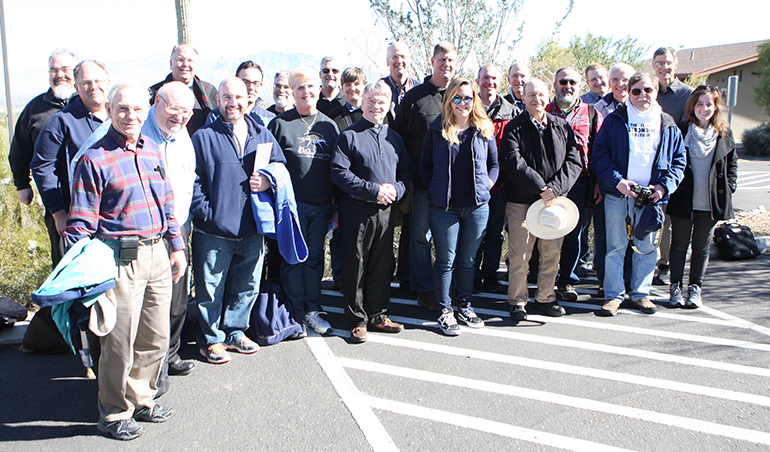
Photographer: COURTESY PHOTO
Bianca Acosta (center, with sunglasses) poses with the 24 other participants in the Vatican Observatory's Faith and Astronomy Workshop, who gathered in Tuscon, Arizona, Jan. 11-15.


Comments from readers